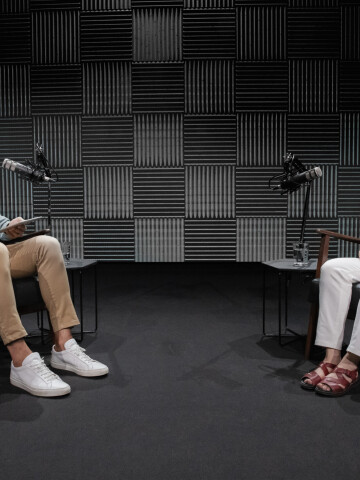
“Working in science means continuous challenges and continuous learning”
April 25, 2024
José Manuel Calderón speaks to Spanish virologist Margarita Del Val for the latest episode of UNIQ
For the second episode of UNIQ, Jose Manuel Calderón sat down with Spanish virologist and immunologist Dr. Margarita Del Val. She has a Ph.D. in chemistry with a major in biochemistry and molecular biology. Her main area of expertise is the study of the immune response to viral infections and she is the coordinator of the Spanish National Research Council’s Interdisciplinary Platform in Global Health.
Del Val has been one of Spain’s leading voices on Covid-19, tirelessly sharing her expertise on viral transmission, vaccines and warning people about the various waves of contagion that have hit Spain since the pandemic emerged.
But we wanted to speak about broader subjects than what the news clips she usually appears on allow. Besides the pandemic, she shared her thoughts on the impact of technology on science, the role of the media in science communication and the rigor that has sometimes been lacking in our public discourse. We also spoke about what it’s like growing up in a scientific family and how going viral (in the online sense) had a major impact on her life.
Science, teamwork and technology
“Science is learning from the past, trying to understand a new problem and coming up with the most probable explanation, the one that comes closest to reality,” said Margarita Del Val in the conversation with Jose Manuel Calderón. Drawing on the example of an elephant, she explained how many people studying and learning about a tiny corner of the world, leads to a better understanding of the situation for everyone. Science is collaboration and getting close to the truth, without ever fully arriving at it, she said.
The collaboration between scientists was on full display during the pandemic. Despite the fact that scientific research is often seen as an introverted and solitary job, she believes that without collaboration and teamwork, it loses much of its value. Personally, she said the skill she honed most during the intense work of the pandemic was working on a team.
“Science is learning from the past, trying to understand a new problem and coming up with the most probable explanation, the one that comes closest to reality”
She also explained how working remotely ended up boosting her ability to collaborate with others. Thanks to digital communication services, she was able to work side-by-side with people working around the world for the Spanish National Research Council (CSIC) as well as with other leading scientists.
Family, young people in science and critical thinking
Del Val was born into a family of scientists. And just like she followed in her parents’ footsteps, her children have also opted for careers in science. Her home environment is impregnated with a love for science that she tries to cultivate in more young people. It’s simply about being curious about the world around you, she says, and having a desire to understand and explain it. She thinks these challenges can serve as a springboard to reach even greater heights.
“Working in science means continuous challenges and continuous learning”
The virologist also highlights the importance of critical thinking. She says it’s fundamental to question scientific advances and understand reality not only through probable explanations but by reasoning to get closer to the elusive truth.
Vaccines, the media and WhatsApp
During the coronavirus crisis, Del Val took on a critical role in the Spanish media. She became one of the main scientific reference points for what was going on with the virus.
Her prominence on the topic started during a conference with around 500 biomedicine scientists from all over the world. There, she submitted a document that predicted the evolution of the virus, which she used clear concepts and data to back up. In the blink of an eye, it went viral. It started to get shared on WhatsApp and eventually reached Spanish government officials and media outlets. From there, she became one of the go-to sources of information for the Spanish-speaking world.
She believes that the media transmit a vision of reality. They are relevant when they can offer their audiences clearly explained knowledge.
“We will have to work hard to protect the rest of the world”
The vaccines are major lifesavers for getting us out of the pandemic, she said. But the world is still suffering from Covid-19. That means that we will most likely have to keep evolving the vaccines (and vaccines are the most complex medicines because they are biological, not chemical) and collaborating with healthcare systems, especially in countries that have less organizational capacity.